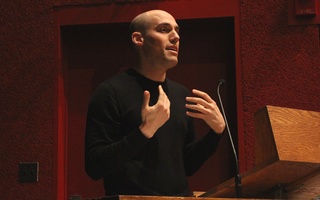{shortcode-02e015722258fa9e5ee9403c8253f458025ae338}
In the 2015 campus climate survey of sexual assault here at Harvard, 26.1 percent of undergraduate seniors (of all genders) reported experiencing some type of nonconsensual sexual contact since enrolling at Harvard. Sexual violence is notoriously underreported due to stigma, shame, and fear, so the real numbers are likely higher.
If 26 percent of Harvard undergraduates will experience sexual assault by the time they graduate, that’s more than 400 people in each class, and almost 2,000 in a four-year period. Who are the perpetrators? If just a quarter of these cases were perpetrated by unique individuals, that’s still 400 people at Harvard who have perpetrated or will perpetrate sexual assault.
Can we expel all 400 of these people? Should we? If we do, I guarantee people you love would be expelled.
We like to imagine that perpetrators are monsters in the shadows, not people who surround us in our everyday lives. When we dehumanize perpetrators, we shirk responsibility for glorifying unhealthy relationships and failing to teach consent.
We also fail survivors by assuming that perpetrators are so rare that stories of sexual violence are fake. We especially fail to give survivors options for healing that do not rely on the criminal justice system. Our current system focuses on punishing perpetrators (if they’re found to be “rightly” accused), rather than healing survivors.
This is where restorative justice comes in. Restorative justice operates outside of the law or the state (which for many are also sources of oppression and trauma). Restorative justice recognizes that when a crime like sexual violence is committed, a person and a community are harmed, and this harm must be repaired. Restorative justice centers healing rather than punishment as true justice. The first step of this is an admission of wrongdoing, and an understanding of the deep harm committed.
College students will likely never admit to what they have done with the weight of punishments like expulsion or jail time hanging over their heads. “The stakes remain too high for the truth to come out,” writes expert practitioner Sujatha Baliga in Vox, “and restorative justice’s core work — recognizing harm, taking responsibility for it, and beginning to repair it — cannot happen under these circumstances.”
So what might restorative justice, which can sound lofty and idealistic, look like in practice? One model we could implement at Harvard is highly facilitated mediation. An expert trained in restorative justice and mental health practices meets individually with the survivor, the person who perpetrated the assault, and others who might be involved (like friends and family), discusses what they will say, and facilitates sessions that can span across months. People are encouraged to speak openly, to tell their truths, and to listen and hear. The ultimate goal is for the survivor to feel empowered and for the person who perpetrated the assault to understand what they did, take responsibility, and engage with the healing steps requested by the survivor.
In a case facilitated by Baliga, the survivor asked for a public apology on social media, and a month of space from Michael, the person who perpetrated the assault. Michael’s friends and family agreed to hold him accountable to this. “And by the end of our time together, it felt like Michael had gained an understanding of consent,” writes Baliga.
How much further could this understanding of consent go towards preventing repeat offenses than a heavy-handed punishment?
Harvard already employs counselors, mental health experts, and Title IX offices. Undergraduates spend years taking classes together, living together, and socializing together. Many survivors are in close proximity at all times to people who have harmed them. The burden of reporting is a turn-off for many: dealing with the exhausting bureaucracy, the many hoops to prove their experience to the administration, and the social backlash. Some even fear the consequences for the perpetrator. Often there is nuance that cannot be addressed with the blunt and onerous instrument of administrative punishment, and therefore survivors may never seek justice or healing.
Restorative justice might not be the answer for everyone, and it is not a prescriptive solution to all cases of sexual violence. Maybe there is no hope for the Brock Turners of the world. But what about the Al Frankens ’73 and the Louis C.K.s, the people who have recognized the harm they caused and want to make amends? One of the most important aspects of restorative justice is giving control back to the survivor, who has the ultimate power to decide whether and how to engage in restorative justice. For some survivors at Harvard, this may not be the right option. But for others — who live in dorms with perpetrators, who go to class with perpetrators, who see perpetrators on a daily basis — this proximity to perpetrators could transform trauma into healing.
Restorative justice would force us as a university community to confront our own culpability in creating a culture of violence and non-consenting behavior. In humanizing perpetrators, we take responsibility. We accept that perpetrators at Harvard are not monsters to be dismissed, but human beings who should take responsibility for the real harm they have done and take part in the hard process of healing.
Elyse N. Voegeli is a second-year masters in public policy student at the Harvard Kennedy School.
Read more in Opinion
Vote Yes on Ballot Question 2Recommended Articles
-
Armed Robbery Tied to Student Attacks, Police SayA Cambridge resident was mugged at gunpoint Saturday night near Central Square in an attack that the Harvard University Police
-
HBS Disciplines Students For Sexual HarassmentSix male Harvard Business School (HBS) students have been officially sanctioned more than 18 months after the first allegations of
-
 ‘The Look of Silence’ Director Joshua Oppenheimer Discusses History, Politics
‘The Look of Silence’ Director Joshua Oppenheimer Discusses History, Politics -
 Winthrop Admins Threaten Disciplinary Action After Vandalism
Winthrop Admins Threaten Disciplinary Action After Vandalism -
 ‘All We Ever Wanted’ is a Nuanced Look at Sexual Harassment’s Ramifications
‘All We Ever Wanted’ is a Nuanced Look at Sexual Harassment’s Ramifications













